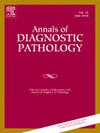Clinicopathological and prognostic significance of stromal p16 and p53 expression in oral squamous cell carcinoma
IF 1.4
4区 医学
Q3 PATHOLOGY
引用次数: 0
Abstract
The tumor microenvironment is highly heterogeneous and consists of neoplastic cells and diverse stromal components, including fibroblasts, endothelial cells, pericytes, immune cells, local and bone marrow-derived stromal stem and progenitor cells, and the surrounding extracellular matrix. Although the significance of p16 and p53 has been reported in various tumor types, their involvement in the stromal cells of oral squamous cell carcinoma (OSCC) remains unclear. We performed immunohistochemical analyses of p16 and p53 expression in OSCC samples, Of the 116 samples, 74 showed p16-positive stromal cells, and 33 showed p53-positive stromal cells. Both p16 and p53 positivity were associated with an increased histological grade, lymphovascular invasion, an immature stromal pattern with abundant amorphous extracellular matrix material, infiltrative invasion patterns (Yamamoto Kohama classification-4C and ![]() 4D), and poor prognosis. Multivariate analyses identified p16 and p53 positivity in the stroma as independent prognostic factors for overall survival (P = 0.032 and P = 0.020, respectively); moreover, stromal p16 positivity correlated with stromal p53 positivity. These findings indicated that p16 and p53 stroma positivity may regulate OSCC tumor aggressiveness.
4D), and poor prognosis. Multivariate analyses identified p16 and p53 positivity in the stroma as independent prognostic factors for overall survival (P = 0.032 and P = 0.020, respectively); moreover, stromal p16 positivity correlated with stromal p53 positivity. These findings indicated that p16 and p53 stroma positivity may regulate OSCC tumor aggressiveness.
口腔鳞状细胞癌间质p16和p53表达的临床病理及预后意义。
肿瘤微环境是高度异质性的,由肿瘤细胞和多种基质成分组成,包括成纤维细胞、内皮细胞、周细胞、免疫细胞、局部和骨髓来源的基质干细胞和祖细胞,以及周围的细胞外基质。尽管p16和p53在各种肿瘤类型中的意义已被报道,但它们在口腔鳞状细胞癌(OSCC)基质细胞中的作用尚不清楚。我们对OSCC样本中p16和p53的表达进行了免疫组化分析,在116个样本中,74个样本显示p16阳性基质细胞,33个样本显示p53阳性基质细胞。p16和p53阳性均与组织学分级升高、淋巴血管浸润、未成熟基质模式伴大量无定形细胞外基质物质、浸润性浸润模式(Yamamoto Kohama分类- 4c和4D)以及预后不良相关。多因素分析发现,间质中p16和p53阳性是总生存的独立预后因素(P分别= 0.032和P = 0.020);此外,间质p16阳性与间质p53阳性相关。这些结果提示p16和p53基质阳性可能调节OSCC肿瘤的侵袭性。
本文章由计算机程序翻译,如有差异,请以英文原文为准。
求助全文
约1分钟内获得全文
求助全文
来源期刊
CiteScore
3.90
自引率
5.00%
发文量
149
审稿时长
26 days
期刊介绍:
A peer-reviewed journal devoted to the publication of articles dealing with traditional morphologic studies using standard diagnostic techniques and stressing clinicopathological correlations and scientific observation of relevance to the daily practice of pathology. Special features include pathologic-radiologic correlations and pathologic-cytologic correlations.

 求助内容:
求助内容: 应助结果提醒方式:
应助结果提醒方式:


